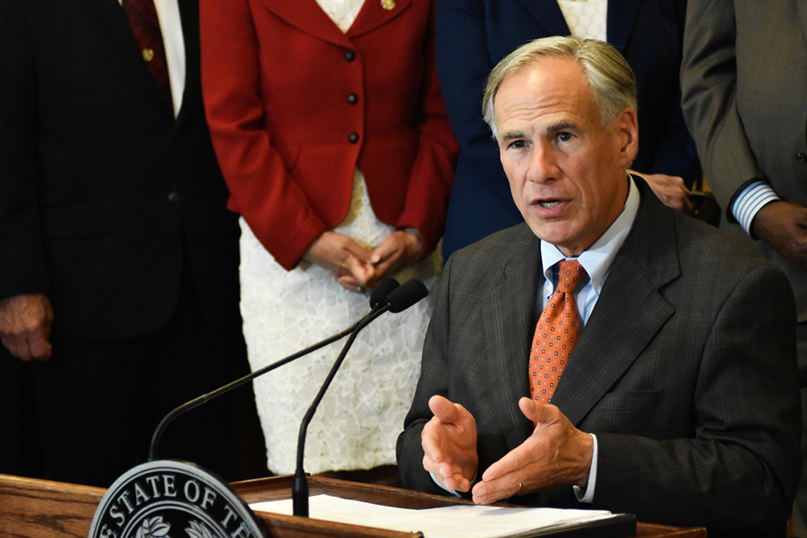
By Dmitriy Shapiro
(JNS) Representatives of multiple Jewish denominations in the United States expressed disapproval of a new law in Texas that makes it nearly impossible for a woman to receive an abortion in the state, especially after the sixth week of pregnancy.
Senate Bill 8, also known as the Texas Heartbeat Act, was signed by Gov. Greg Abbott on May 19 after passing on party lines in both houses of the Texas legislature.
Late on Sept. 1, in a 5-4 decision, the U.S. Supreme Court denied an emergency request for an injunction from women’s health organizations on the law while its constitutionality is being challenged in the courts.
Leaders of the Reform movement were quick to condemn the new law in a letter signed on Sept. 2 by multiple organizations connected with the movement, noting many women don’t even realize they are pregnant in the first six weeks.
The legislation, they argued, thwarts the legal system’s ability from protecting “reproductive freedom” by prohibiting state officials from enforcing the law but allowing Texans to sue anyone who assists a woman in accessing or provides the abortion, which opens abortion clinic staff to potentially ruinous lawsuits.
“We are concerned about individuals who cannot afford to travel long distances to secure abortion care in neighboring states. We are also deeply concerned about Jews who will be unable to pursue an abortion in keeping with Jewish law, which mandates abortion when necessary to preserve the pregnant person’s well-being,” the letter read.
The statement also acknowledged traditional Jewish views on abortion, and that the movement was against enforcing through legislation the Jewish view for society at large and is against any other groups imposing their religious belief upon the Jewish community.
“We will continue to work to overturn this law, prevent similar laws from being adopted in other states and affirm the right of every person to make their own reproductive health decisions,” the letter read.
It was signed by leaders from 12 organizations affiliated with the Reform Judaism movement.
Agudath Israel of America, an organization that advocates for the ultra-Orthodox communities in the United States, said it also opposed the bill.
“Agudath Israel opposes any abortion law that would restrict an American’s right to act in accordance with her religious beliefs. And the Texas law would seem to do that,” Rabbi Avi Shafran, director of public affairs for Agudath Israel, wrote in an email on Sept. 2.
Where Shafran disagreed with the Reform leaders was the insinuation that abortion was a choice in Judaism.
In an article for the Religion News Service this July, when Jewish organizations were weighing in on Mississippi’s 15-week abortion ban as the Supreme Court decided to review the law, Shafran wrote that halachah (Jewish law) forbids abortion in most cases when the life or health of the mother is not in danger—something that he believes should be accounted for regarding laws.
This danger applies not only to the physical health but also to the mental health of the woman, such as if the result of carrying a pregnancy to term could lead to potential injury or even suicide.
“Those cases are not only rare but dependent entirely on halachic judgments, not on the ‘choice’ of a person carrying a potential life in utero. In halachic responsa—responses to real-life questions and situations put to rabbinic scholars, spanning centuries—not one responsum on abortion considers it to be a simple choice that can be made at will,” wrote Shafran.
“Judaism, as it happens, is overwhelmingly about responsibilities, not ‘rights,’ ” continued the rabbi. “And one such responsibility is the protection, in most cases, of fetuses. There may be rare cases where those responsibilities are superseded by other concerns, but, put starkly, it is almost always Jewishly wrong to end even a potential life.”
The Rabbinical Assembly, which represents the Conservative movement in the United States, echoed the concerns of the Reform movement.
“It is a law designed to restrict reproductive rights, rather than allow Texas women to choose freely for themselves, in consultation with medical professionals, religious authorities and their own consciences,” the organization wrote in a news release on Sept. 3. “The law also takes the unprecedented step of allowing any Texan to sue anyone else who believed to have helped another access an abortion, regardless of their location in the state or standing in the case.”
It also stated that it will work to overturn the law—to return the right to choose and religious freedom to Texas women, and all other such laws the organization said it believes violate the U.S. Constitution.
“We learn in Judaism that while the fetus has a special status as a potential life, full personhood does not begin at conception, but rather at birth, as indicated by Exodus 21:22-23,” the release stated. “In our understanding of Jewish law and tradition, abortion is permitted and often mandated in cases where the life of the mother is at risk, regardless of the stage of her pregnancy. Barring a woman from accessing an abortion not only blocks her right to choose, but also her religious freedoms.”
Main Photo: Texas Gov. Greg Abbott Credit: Carrington Tatum/Shutterstock








 Southern New England Jewish Ledger
Southern New England Jewish Ledger








